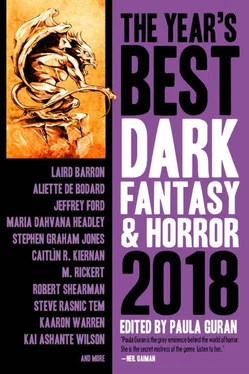Several houses had yellow police tape stretched across their front doors and around their near-identical porches. He assumed the police actions had something to do with drugs; in the news it always had something to do with drugs. That and gang activity. A lot of these poorer teens fell into gangs.
When Simon was young a bike ride to and from this neighborhood had been nothing. He’d fly down the steep curl of road and although the trip back up was a challenge he accomplished it without too much difficulty, feeling like a star athlete afterwards. Not anymore. He should have kept in better shape. Once here, he didn’t expect to leave often. He supposed that was how older people became trapped.
He found the house Will was providing—low and dark and indistinguishable from the others. The newish lock looked inexpertly installed, the hasp mounted crookedly, and rattled as he fiddled with the key. Simon slipped inside and slapped the switch, lighting up the messy interior. He gasped involuntarily from the stench: human waste and aromas both sweet and sour underneath. He reminded himself that his cousin was allowing him to stay here for nothing.
Houses weren’t built to last anymore, nor did it make sense to. Technological expectation changed so quickly it didn’t pay to invest in building for the long term. People moved on, although not necessarily up.
When he first glimpsed the living room walls he imagined a crowd of onlookers, but the arrangement of shadows proved to be stains. Studs and nail head patterns were clearly visible beneath the thin paper.
Cleansers and chemicals and various old tools were stored in a closet with random junk. He couldn’t tell how old any of it was, or how dangerous, but he did what he could, sweeping the foulness out the back door and dumping chemicals on the hardwood floors where they’d been deeply stained, windows open to the cold air to get rid of the smell. He just needed to get his situation clean enough so that he wouldn’t mind sleeping on the floor. The revealed boards were scarred as if from games or ritual. Or maybe from cats. Cats can do a lot of damage if locked inside by themselves.
On several walls sprays of relatively fresh graffiti obscured older layers of scribbling, and here and there certain words and symbols were emphasized by means of deep cuts. He could make no sense of it, although the patterns of marks created an emotional effect not unlike music, so he wondered if some of these marks referred to songs. Over the days to come he painted over the graffiti, but with no confidence it wouldn’t return.
Long threads of dust floated through the rooms. The remnants of his old life were hardly more substantial than these. With most of the people he’d ever known gone, the fabric of day to day reality seemed thin.
That old house where he’d grown up had probably been less than a hundred yards from here. It had a screened back porch where on late nights the adults filled their drink cups and the children consumed their allotted portions of sugar and ran mindlessly around the yard. This house and the ones around it had no back porch and he wondered when those had gone out of fashion. No doubt around the same time as gatherings with the neighbors.
He remembered games of hide and seek that lasted for hours and covered every lot in the neighborhood. He remembered childhood crushes on young girls whose names he no longer remembered. He remembered he would not take a bath when a certain babysitter was on duty, the one who always wanted to help.
In one corner of the living room a sleeping bag, some toiletries, and food had been left for him. When he thought he’d cleaned sufficiently for a relatively untroubled night’s sleep he crawled into the bag and succumbed almost immediately.
The morning came quickly. He had dreamed and sweated, and now the sleeping bag stank. He wondered who might have used it before. He crawled out and walked barefoot into the kitchen, splashed his face with water tinged a muddy rust color. He’d let it run until it cleared. He went to the back door and opened it for air and sun.
He was surprised not to see the sun, or even the sky. A few feet in front of him a tall brick wall with curtained casement windows blocked his view, awash in smoky gray shadow, part of a larger house that rose three stories. Looking straight up he glimpsed the old-fashioned soffits and Victorian roof. It looked somewhat like the house he’d grown up in, except larger. Turning his head he saw similar large houses out to both sides, an entire neighborhood of slummy Victorians in ill repair. He could also hear creaky music, children’s voices, a cat’s howl, the soft explosive echo of a distant barking dog. But he couldn’t make out any of the finer details of his surroundings, not even this close.
Simon went to get his flashlight for a more detailed look. But when he came back there was the sky, and the sun just over the treetops illuminating a vista of dull one story homes. The filth he’d scraped from the house the night before still lay piled around the bottom step. Sometime during the day he would have to bury it.
He took a breath. He hadn’t been fully awake. It happened sometimes, even several minutes after walking around, a piece of dream still lodged in your brain changes the world. There were the sounds of children squealing like the damned in a nearby yard, but was that still part of the dream? The excited screams of children at play often fooled you into thinking there had been some grave tragedy.
Simon worked several hours in the bathroom and kitchen—scrubbing and throwing out the useless and the unsalvageable—not bad for an out of shape old man, he thought. He felt uncomfortably heated and propped open the back door. The outside temperature had dropped precipitously. He’d tried the thermostat but the furnace wouldn’t come on. Another problem to ask Will about. Whatever sounds he heard—the whistle of a speeding car, the broken explosions as a plane pushed through the air overhead—were very far away. Whoever lived nearby was impressively quiet. “Safe as houses,” as his mother used to say, but it never reassured. Some houses weren’t safe at all.
Cooking smells drifted in from outside—some sort of richly spiced meat, perhaps a stew. Someone in the neighborhood knew how to cook.
He thought he heard a school bus pull up and children piling out, but the sounds faded quickly, swallowed by the increasing rush and push of the wind. It would be a breezy time for a walk, but he’d only have light for a couple more hours, and Simon wanted to see the neighborhood and some of its residents in the light of day.
The wind hitting the house made a constant groan. Simon wondered if the poorly built structure could bear it—he imagined minute fracturing exacerbating decay, perhaps even some sort of collapse. A sick apprehension heightened his need to get out.
Outside in his coat he walked toward the broken playground. He kept his eyes open for people, but after a few blocks there was nothing, not even any toys left outside or laundry on a line. He listened carefully for conversation or music—he was sure he’d heard some before—but all he heard now was the wind battering the shoddy roofs, and a whistling down the lanes between the structures.
There should have been teenagers out, even if the adults had the sense to stay inside. Teenagers were the adventurers and the hasty ones, those always said to be “at risk.”
A sudden clamor from several houses over made him pick up the pace. But it was just a piece of roof blown off into a side yard. He wondered if his own roof was sound. He stared hard at the twisted bit of wreckage, the curly shadows trapped beneath. Then a mass of the curly shadows unfurled and escaped around the edge of the house on its too many legs. A cat with insulation tangled into its fur, he presumed, living in the house’s attic. Poor thing. That’s when it started to rain.
Читать дальше












